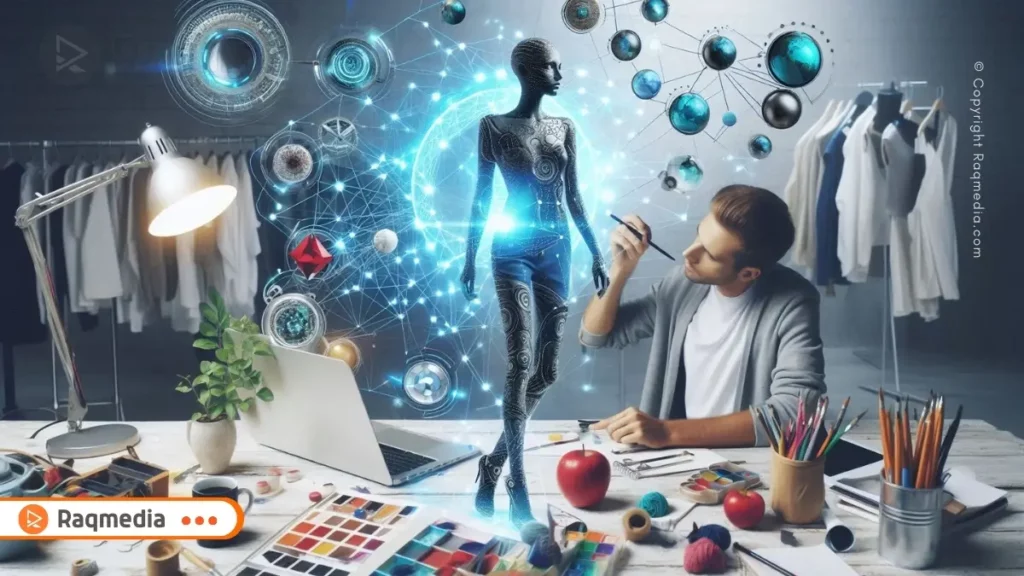Step onto the runway of innovation where fashion meets technology in a harmonious dance of creativity and ingenuity. Enter the world of Generative AI, a revolutionary concept reshaping the very fabric of the fashion industry. This transformative technology goes beyond traditional design practices, infusing garments with a touch of digital magic to create trends that are as unique as they are trend-setting. Generative AI heralds a new era where design, personalization, and sustainability intertwine seamlessly, offering a glimpse into an avant-garde future where style is not just adorned but encoded with intelligence.
Innovating Fashion: Designing Fashion Trends with Generative AI
Within this dynamic landscape, designers wield the power of generative AI to unlock unparalleled possibilities in their creative processes. From ideation to execution, this cutting-edge tool serves as both muse and maestro, orchestrating innovative designs that push boundaries and redefine aesthetic norms. Embracing personalization at its core, generative AI ushers in a bespoke era where garments are tailored not only to fit sizes but also individual personalities and preferences, fostering a deeper connection between fashion and consumer. Moreover, sustainability takes center stage as generative AI optimizes production practices, minimizing waste and maximizing efficiency without compromising on style or substance.

As we peel back the layers of this technological revolution, it becomes evident that Generative AI is not just designing trends – it's designing a visionary future for fashion where every stitch tells a story of innovation and evolution. Fashion trends redefined by generative AI: Experience the fusion of art and technology in designing innovative, forward-thinking styles.
The Rise of Generative AI in Fashion
Generative AI has emerged as a game-changer in the fashion industry, revolutionizing traditional design methods and empowering designers with innovative tools. The evolution of generative AI within fashion showcases a shift towards more data-driven and tech-savvy approaches to design. Designers are increasingly leveraging this technology to explore new avenues of creativity, pushing the boundaries of conventional fashion trends. By harnessing the power of generative AI algorithms, designers can generate complex patterns, textures, and shapes that were once unimaginable through traditional design processes.
One remarkable aspect of generative AI is its ability to assist designers in creating truly unique and trend-setting designs. By analyzing vast amounts of data on consumer preferences, historical trends, and cultural influences, generative AI empowers designers to develop personalized and cutting-edge creations. Brands like Tommy Hilfiger have embraced generative design tools to craft customized fabrics and prints that resonate with their target audience's evolving tastes. This technology transcends mere automation; it fosters a symbiotic relationship between human creativity and machine intelligence, leading to the birth of entirely novel design concepts.
The impact of generative AI on fashion extends beyond individual design processes – it permeates every aspect of the industry, from retail experiences to sustainability efforts. As more fashion houses integrate generative AI into their workflows, we witness a paradigm shift towards a more efficient and dynamic creative ecosystem. Designers are not only able to streamline their production processes but also respond swiftly to market demands by adapting designs in real-time based on consumer feedback. Ultimately, generative AI is reshaping the future landscape of fashion by fostering a culture of experimentation, innovation, and agility among designers worldwide.
Personalized Clothing Recommendations With Generative AI
Generative AI has ushered in a new era of personalized shopping experiences in the fashion industry, where consumers can receive tailored clothing recommendations based on their unique preferences and styles. This innovative technology analyzes vast amounts of data on consumer behavior, fashion trends, and individual choices to curate customized suggestions that align with each shopper's tastes. By harnessing the power of generative AI, fashion brands can offer customers a highly personalized shopping journey that resonates with their specific needs.
One of the key benefits of personalized clothing recommendations generated by AI is the enhanced customer satisfaction resulting from a more relevant and curated selection of products. By understanding each individual's style preferences, color choices, body measurements, and past purchases, generative AI algorithms can accurately predict what items will appeal to customers, leading to increased engagement and loyalty. This level of personalization fosters a stronger bond between consumers and brands, ultimately driving higher conversion rates and repeat business.
Leading fashion brands are at the forefront of leveraging generative AI to deliver exceptional personalized recommendations to their customers. Companies like Stitch Fix use sophisticated algorithms powered by AI to provide clients with personalized styling suggestions based on detailed style quizzes and feedback from stylists. Through these tailored recommendations, customers receive curated selections that align with their unique fashion sense, creating a seamless shopping experience that caters to their individual tastes. This level of customization not only enhances customer satisfaction but also sets brands apart in an increasingly competitive market where personalization is key.
Sustainable Production Practices: Redefining Fashion Manufacturing with Generative AI
Generative AI is transforming the landscape of sustainable production practices in the fashion industry by offering innovative solutions that prioritize efficiency and eco-consciousness. One key advantage of generative AI is its ability to optimize material usage during the manufacturing process, thus reducing waste and promoting sustainability. By utilizing algorithms that can analyze and predict material needs more accurately, designers and manufacturers can minimize excess inventory and prevent overproduction, leading to a more sustainable approach to creating clothing. This shift towards smarter material management not only benefits the environment but also helps brands streamline their supply chains and reduce costs.
Real-world examples of brands implementing eco-friendly practices with generative AI abound, showcasing the tangible impact of this technology on sustainability efforts in fashion. For instance, renowned athletic brand Adidas has embraced generative design tools to create running shoes that are not only performance-driven but also environmentally conscious. By leveraging generative AI algorithms to optimize the design process, Adidas has been able to significantly reduce material waste while still delivering high-quality footwear tailored to athletes' needs. This success story underscores how cutting-edge technologies like generative AI can drive positive change within the fashion industry, setting new standards for sustainable production practices.
Furthermore, generative AI plays a crucial role in promoting circular economy models within fashion manufacturing. By analyzing data on consumer preferences and behaviors, this technology enables brands to produce garments with a higher likelihood of being utilized long-term, thus reducing the environmental impact of fast fashion cycles. Through predictive analytics and demand forecasting powered by generative AI, companies can align their production processes more closely with market needs, minimizing overstocking issues and encouraging responsible consumption patterns. As sustainability continues to be a focal point for both consumers and industry stakeholders, generative AI emerges as a powerful tool for fostering greener practices in fashion production while driving innovation on multiple fronts.
Redefining Fashion Design Processes
Generative AI is not only transforming the way fashion is produced but also redefining the very essence of design processes within the industry. By integrating data-driven insights and creative algorithms into design workflows, designers now have powerful tools at their disposal to push boundaries and create truly innovative collections. This marriage of technology with creativity allows for a new level of experimentation and exploration that was previously unimaginable.
One remarkable aspect of generative AI in design processes is its ability to analyze vast amounts of data to identify patterns and trends that human designers might overlook. By understanding consumer preferences, market trends, and even cultural influences on a deeper level, designers can make more informed decisions when creating new pieces. For example, a designer could use generative AI to analyze social media data to predict upcoming color trends or style preferences, enabling them to tailor their collections more accurately to meet consumer demands.
Furthermore, the integration of creative algorithms in design workflows opens up a world of possibilities for artistic expression. Designers can input parameters or constraints into AI systems and generate countless iterations of designs based on those criteria. This not only speeds up the creative process but also encourages designers to think outside the box and explore unconventional patterns, shapes, or materials that they might not have considered otherwise. Ultimately, by redefining design processes through generative AI, the fashion industry stands at the forefront of innovation and creativity.
Enhancing Customer Engagement with Generative AI
Generative AI has revolutionized customer engagement strategies in the fashion industry, offering brands innovative ways to connect with their audience. By leveraging interactive elements powered by AI, fashion brands can provide personalized shopping experiences that cater to individual preferences and styles. For example, virtual try-on tools driven by generative AI allow customers to visualize how a garment would look on them before making a purchase, enhancing confidence and reducing return rates. This interactive feature not only simplifies the buying process but also boosts engagement by creating immersive online shopping experiences.
One successful case study of generative AI enhancing customer engagement is seen in the use of chatbots on e-commerce platforms. These AI-powered assistants utilize generative algorithms to understand customer queries and offer tailored recommendations, mimicking a personalized shopping assistant experience. Through natural language processing capabilities, these chatbots can guide customers through product selections based on their style preferences and previous purchases. This level of personalized assistance deepens customer interactions with the brand, driving loyalty and repeat purchases.
Furthermore, generative AI has enabled fashion brands to implement augmented reality (AR) technology for virtual styling sessions. Customers can virtually ‘try on' different outfits or experiment with new looks through AR filters powered by generative algorithms. This not only enhances the fun and interactive aspect of fashion retail but also provides valuable insights into consumer behavior and preferences. By offering unique and engaging experiences through generative AI technologies, fashion brands can foster stronger connections with their audience and stay at the forefront of customer engagement strategies in a rapidly evolving digital landscape.
Ethical Considerations and Future Implications of Generative AI in Fashion
As the fashion industry continues to embrace generative AI for design and production, it raises important ethical considerations related to intellectual property rights and data privacy. Designers utilizing AI tools must navigate the fine line between leveraging algorithms to enhance creativity while respecting originality and protecting their designs from unauthorized duplication. Issues such as plagiarism detection and copyright infringement become crucial in a landscape where AI-generated outputs blur the boundaries between inspiration and replication. Ensuring that AI-generated designs respect intellectual property laws is essential for fostering innovation while safeguarding creators' rights.
Looking ahead, the widespread adoption of generative AI in the fashion sector poses significant future implications that extend beyond design processes. One key aspect revolves around the shift in consumer behavior towards personalized, on-demand fashion driven by AI recommendations. This trend raises questions about sustainability, as increased customization may lead to greater production volumes and potential waste if not managed effectively. Additionally, the reliance on complex algorithms for predicting trends and consumer preferences could inadvertently reinforce biases or limit diversity in design choices if not carefully monitored and regulated.
Addressing these ethical concerns requires a multi-faceted approach that combines industry standards, regulatory frameworks, and consumer education. Fashion brands can promote transparency by clearly disclosing the use of AI technologies in their design processes and ensuring that data privacy regulations are adhered to when collecting customer information for personalized recommendations. Collaborations between designers, tech experts, policymakers, and ethicists can help establish guidelines that balance innovation with ethical considerations, ultimately driving sustainable growth within the fashion industry. By proactively addressing these challenges, stakeholders can harness the power of generative AI to revolutionize design while upholding values of creativity, authenticity, and responsibility.
The Future Fashion Landscape with Generative AI
In the dynamic realm of fashion, the integration of generative AI represents a transformative force shaping the industry's future landscape. As designers harness the power of AI to innovate and personalize their creations, the traditional boundaries of design are being redefined. By leveraging data-driven insights, creative algorithms, and sustainable practices facilitated by AI technology, fashion houses are on the cusp of a paradigm shift towards more efficient, ethical, and customer-centric approaches.
Looking ahead, the adoption of generative AI in fashion holds immense potential for further enhancing customer engagement and brand-consumer relationships. Interactive elements powered by AI not only streamline shopping experiences but also cater to individual preferences seamlessly. Moreover, as brands increasingly prioritize sustainability through optimized production processes made possible by AI-driven solutions, the path toward a more eco-conscious fashion industry becomes more tangible than ever before.

As we navigate this technological revolution reshaping the design landscape, it is essential to balance innovation with ethical considerations. Safeguarding intellectual property rights and ensuring data privacy are paramount concerns that must be addressed proactively to maintain trust among all stakeholders. With a collaborative effort from designers, technologists, consumers, and policymakers alike, the future fashion landscape painted by generative AI stands poised at the intersection of creativity and responsibility.
Embracing the Future of Fashion with Generative AI
In conclusion, the fusion of technology and creativity has paved the way for a new era in the fashion industry. Generative AI is not merely a tool but a catalyst for innovation, personalization, and sustainability. As we have explored throughout this article, designers are now equipped with powerful algorithms that can inspire trend-setting designs, offer personalized recommendations to consumers, optimize production processes, redefine traditional design workflows, and enhance customer engagement strategies. The marriage of data-driven insights with artistic visions is redefining how we perceive and interact with fashion.
As we gaze into the future fashion landscape, it becomes evident that the integration of generative AI will continue to shape the industry's trajectory. Ethical considerations will require careful navigation to safeguard intellectual property rights and data privacy while maximizing the benefits for sustainable growth. The possibilities unleashed by generative AI are endless, promising a realm where creativity knows no bounds and where every consumer can feel seen and understood in their unique style preferences. Fashion isn't just about what we wear—it's about revolutionizing how we express ourselves and connect with the world around us.
FAQs:
1. What role does generative AI play in reshaping traditional design processes in fashion?
Generative AI integrates data-driven insights and creative algorithms into design workflows, empowering designers to push boundaries and create innovative collections.
2. How does generative AI facilitate sustainable production practices in the fashion sector?
By optimizing material usage and reducing waste during manufacturing, generative AI helps brands implement eco-friendly practices that benefit both the environment and their bottom line.
3. Can generative AI truly provide personalized clothing recommendations for consumers?
Yes! Generative AI enables tailored suggestions based on individual preferences and styles, offering a unique shopping experience for customers.
4. What impact does generative AI have on enhancing customer engagement strategies for fashion brands?
Interactive elements powered by AI improve the shopping experience by providing personalized recommendations and engaging content that resonates with consumers.
5. What ethical considerations should be addressed regarding generative AI in fashion?
It's essential to navigate concerns surrounding intellectual property rights, data privacy, and transparency to ensure ethical use of generative AI within the industry while maximizing its benefits for sustainable growth.










Elevate your style game with generative AI – Dive into a world of endless possibilities in fashion design as we push boundaries and set new trends.